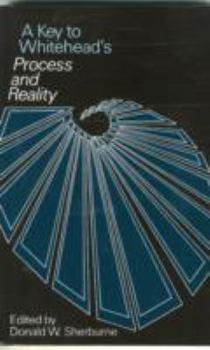A Key to Whitehead's Process and Reality
Whitehead's magnum opus is as important as it is difficult. It is the only work in which his metaphysical ideas are stated systematically and completely, and his metaphysics are the heart of his philosophical system as a whole. Sherburne has rearranged the text in a way designed to lead the student logically and coherently through the intricacies of the system without losing the vigor of Whitehead's often brilliant prose. "The Key renders...
Format:Paperback
Language:English
ISBN:0226752933
ISBN13:9780226752938
Release Date:September 1981
Publisher:University of Chicago Press
Length:272 Pages
Weight:0.65 lbs.
Dimensions:0.6" x 5.3" x 7.9"
Customer Reviews
5 ratings
Kudos to Donald Sherburne!
Published by Thriftbooks.com User , 19 years ago
I am proud to say I own this book. Sherburne does an excellent job laying out the arguments in a systematic fashion. He says he did this, because the reader "will not find a linear development PR, a beginning, a middle, and an end." It is this approach that keeps the spirit of Whitehead's PR alive and makes it accessible to the determined reader--I say determined because it still is difficult trying to interpret the content of Whitehead's "Speculative Philosophy." Of course for being only 261 pages this book isn't an "exhaustive account of all aspects of Whitehead's thought." A key can unlock a door, but you still have to go through the door to see what is on the other side. I would encourage anyone to take Sherburnes key to unlock the door to Process and Reality...
An excellent primer
Published by Thriftbooks.com User , 20 years ago
Alfred North Whitehead, in his magnum opus 'Process and Reality', set forth a philosophical framework that has inspired the subsequent generation of theologians to look towards a new system of metaphysics, ethics, epistemology, and theological reality. One of the problems with 'Process and Reality', however, is that it is not a very accessible text to most people, even to most theologians. Donald Sherburne has done great service to legions of pastors, students, and interested lay persons by simplifying and reorganising the text of 'Process and Reality' into a more logical and easier-to-read text.Sherburne's introduction speaks of the lack of information available on Whitehead - since his death in 1947, his influence has been confined to philosophy and theology, and then only at graduate-student and higher levels. This has not changed, for the most part, in the decades since the first publication of Sherburne's text, but it is beginning to make itself felt in various levels through grassroots 'evangelism' of process thought principles.The text itself is organised to allow primary emphasis on Whitehead's own writing from 'Process and Reality', followed closely in the chapters by paragraphs of explanation and commentary by Sherburne (these are presented in an italicised typeface, making the distinction between Whitehead's words and the commentary very clear). The rearrangement of topics follows more closely what a typical student of philosophy might expect to find in any other philosophy text. Like logic or geometry (Whitehead was a protégé of Bertrand Russell of Principia Mathematica fame), it begins with basic principles and concepts. For Whitehead, this is the actual entity and the process itself. From this, the text explores how things are what they are, and how we can come to know them. How things are constituted involved their formative elements; for Whitehead, these consist of God, creativity, and the pure potentiality inherent in the universe. With these in mind, the process of concrescence is presented. Sherburne then presents ideas of the macrocosmic and nexus, and the requirements and limitations on perception. This leads to a discussion of Whitehead versus other philosophers, many of whom will be far more familiar to the readers. Descartes, Hume, Locke, Kant, and the methods of science (through a lens of Newton and Plato first, then further developed) are explored. The seventh chapter, on God and the World, is perhaps the most interesting and useful to theologians. God's primordial and consequent natures are explored. Whitehead uses the process ideas set forth earlier to look at the concept of immortality, in particular, the love of God for the world, and the process by which all of reality can be redeemed and held complete in the mind of God.Sherburne states that the Appendix - In Defense of Speculative Philosophy - can be read first or last in the text; Sherburne actually recommends both, so that Whitehead's Defense can s
you'll need this one...
Published by Thriftbooks.com User , 23 years ago
...if you want to understand Whitehead but haven't attempted him yet. Sherburne does indeed provide a key to Whitehead by unlocking his concepts one by one and explaining them in plain English. Recommended.
This key really works
Published by Thriftbooks.com User , 24 years ago
This book is the place to start if you want to understand Whitehead's Process and Reality. Sherburne has done a masterful job of explaining Whitehead's many neologisms. Process and Reality is one of the masterworks of 20th century philosophy, however its terminology make it hard to comprehend. Sherburne's book makes Process and Reality accessible even to non-philosophers.
This key really works
Published by Thriftbooks.com User , 24 years ago
This book is the place to start if you want to understand Whitehead's Process and Reality. Sherburne has done a masterful job of explaining Whitehead's many neologisms. Process and Reality is one of the masterworks of 20th century philosophy, however its terminology make it hard to comprehend. Sherburne's book makes Process and Reality accessible even to non-philosophers.




